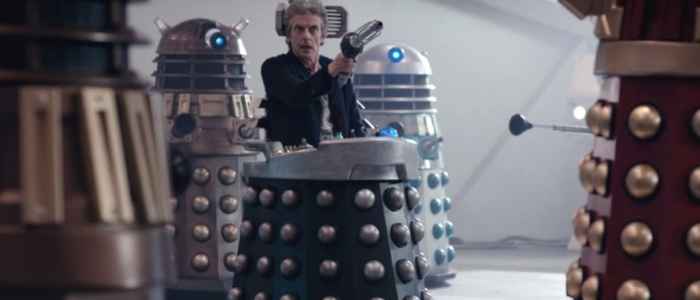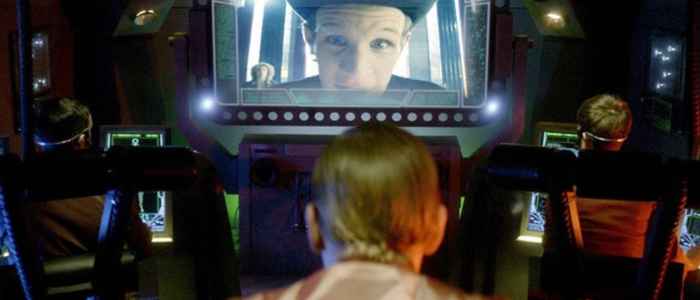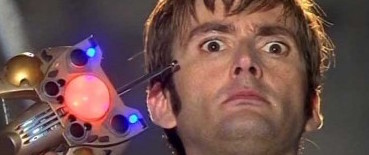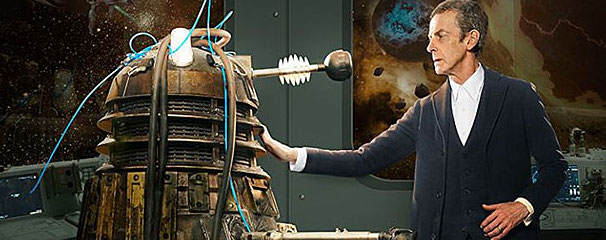The Moral of Doctor Who: Answering the Questions of “Genesis of the Daleks”

“The Magician’s Apprentice/The Witch’s Familiar,” is the opening episode to the ninth series (or 35th season, depending on how you count) of the British television show Doctor Who, a show about an alien called the Doctor who travels in time and space. This recent episode picks up on themes from a much older episode, “Genesis of the Daleks” (1974). In one notable scene in “Genesis,” the Doctor holds two wires, knowing that if he touches them together, he will destroy the Daleks, an evil race of aliens who want to destroy all non-Dalek life. Suddenly, the Doctor asks, “Have I that right?” In that moment, he realizes the decision to destroy all the Daleks would be tantamount to genocide, a crime for which the Daleks are well known and which the Doctor detests. “If someone who knew the future, pointed out a child to you and told you that that child would grow up totally evil, to be a ruthless dictator who would destroy millions of lives… could you then kill that child?” he asks. Arguably, these are two different questions – 1) is it okay to kill all Daleks ever and 2) is it okay to kill someone innocent just because you know they will be guilty. Ultimately, he is saved from needing to find an answer because an ally comes to tell him Davros has agreed to put progress on the Daleks to a vote (though this vote turns out to be a scheme on the part of Davros).
That “The Magician’s Apprentice” has this scene in mind is clear – it even incorporates quotes from the “Genesis” scene in the background. More poignantly, and more to the point, the episode opens with the Doctor trying to save a child from a war zone – a child who turns out to be Davros. The decision of whether to save the child renews the theme of “Genesis” – as a time traveller, can you kill someone you know will grow up to be evil? As the show continues, the Doctor meets the old, dying Davros and is shown the very life force of the Daleks (again in the form of wires). The Doctor must decide – Do you save a child who will grow up to be evil? and Do you commit genocide against the Daleks, who want to commit genocide against every other living species?
Before now, “Genesis of the Daleks” stood as a unique example in Doctor Who. Although the Doctor often claims to have a moral code, he always manages to win by outsmarting his enemy. It becomes unclear whether the message of Doctor Who is “be good” or simply “be clever.” “Genesis of the Daleks” was a unique example where the Doctor lost, Davros won, and the moral code proved potentially more important to the Doctor than his winning. Thus, what “The Magician’s Apprentice” does with these themes from “Genesis” carries tremendous importance for the series.
“Could you then kill that child?”

When the Doctor learns the child is Davros, he freezes in place. The theme song begins and the episode leads us to believe that he saved the child. However, we later learn that upon hearing the child was Davros, the Doctor left the child to die.
His decision to come back for the child is motivated by his realization at the end that the Daleks know the word for “mercy,” that this word is the only way he managed to save his companion, Clara, and that they must have gotten this word from his interaction with the child Davros. And so the Doctor returns to the past to save the child Davros, and in doing so he is, “Saving my friend the only way I know how” – i.e. by not killing anyone. The Doctor tells Davros that sides don’t matter because there should always be a place for mercy.
However, this decision to save the child is fueled by a desire to save Clara – a desire that will drive the Doctor later in the series to betray the Time Lords and risk damaging the universe. Perhaps he has grown by the end of the episode, perhaps the Doctor has realized the importance of mercy – or perhaps he is simply saving his friend.
Regardless, at the beginning of the episode, the Doctor may not kill the child, but he seems content to allow the child to die. There is, at the beginning of the episode anyway, a loophole in his moral code that will allow him to effectively kill the child.
Could you kill the Daleks

The Doctor is given the opportunity at the beginning of his talk with the old and dying Davros to cut the wires and kill all the Daleks. He doesn’t. At first this seems like a moral victory for the Doctor, who can resist the temptation to commit genocide even against his greatest foe. At first.
But then, as the Doctor and Davros talk, Davros explains that he wants just a little regeneration energy from the Doctor so that he can watch the sun rise over his own planet. Regeneration energy is the energy Time Lords (such as the Doctor) use to stay alive for so long, and Davros is so weak he cannot open his eyes. In what seems like the ultimate mercy for an old foe, the Doctor agrees, starts to use some regeneration energy, and touches the aforementioned wires, which hook up the Daleks to Davros. But alas! Davros was trying to trick him and now highjacks the regeneration energy for himself and his Daleks in an attempt to create a Time Lord-Dalek hybrid.
And here the Doctor would have died if he had not been saved by Missy. At this point, it begins to become apparent that the Doctor knew this would happen from the beginning of the episode – barring the being saved by Missy. The Doctor knew he would be called to Skaro, knew why, and believed he would die on Skaro performing this act. And he did it because, he reveals, he knew this act would bring the sewer full of Dalek carcasses back to life, and that this sewer would attack the other Daleks. The Doctor’s plan was to destroy all the Daleks, but he tricked Davros into pulling the switch. In other words, here too we find a loophole in the Doctor’s moral code: it is not okay to commit genocide, but it is okay to trick your enemy into committing genocide for you.
Who is the hero of “The Magician’s Apprentice”?

And finally we get to this bizarre question. The Daleks have shown a capacity for kindness. More than just saying, “Mercy,” the Daleks are sacrificing their own life force to keep Davros alive. This is mercy acted out – this is exactly something the Doctor would do for a companion. So while the Doctor is not saving children (until the end) and conspiring to commit genocide (or rather, to trick Davros into committing genocide), the Daleks are trying to save a man they… love?
And so there is a Doctor-Dalek hybrid – it’s just a Dalek. And it’s not pure evil.
What do you think? Leave a comment.










My first episode of Who was a broadcast of Genesis of the Daleks in 1982. I’ve been a fan ever since.
The recent episode hit me right in the part of my soul that found and loved the show 35 years ago. When they played the Tom Baker monologue I started to cry, as that has always been the cornerstone of my love for the show.
My 1st exposure to Who was World War Three and it was just a random bored changing the channel while I’m sick thing and then I was like whoa what is this show. Then I looked it up to see what show it was and to see if there’s gonna gonna be a marathon soon. The first full episode of Who was Rose.
My first exposure to Doctor Who was when I was really young and somebody was climbing a spooky tower and someone else was talking about trying to fix a spaceship and my uncle said “hey doctor who’s on!” but I thought it looked dumb so I left the room. I rediscovered the show many years later, of course, but I always wished I could figure out what episode it was that my eyes first caught a glimpse of.
I remember that one! It was with The Wire, a monster using TVs to feast on people, making them faceless. You should look it up, its worth a look. Althought… it could be something else, I dont remember spaceships being involved
So my first exposure to Doctor Who was around when the Pertwee episodes started airing on PBS stations in the US in the 1970s. The show wasn’t well-known here yet (it became a cult hit when they started airing the Tom Baker years), and I had no idea what it was, but I came across it when flipping channels.
It was either “Spearhead from Space” (which was, I believe, actually the very first story to air in the US) or “Terror of the Autons”, and the idea of these guys whose hands could flip open and guns would come out freaked me out. I decided not to watch that Doctor Who thing again if I could help it. So I didn’t for many years.
I had no idea that I’d just had the classic iconic Doctor Who experience. For my daughter it was the Weeping Angels that scared the crap out of her.
You know, Doctor Who turned into Breaking Bad so gradually I didn’t even notice.
As a long-time fan (39 years and counting) I loved all the classic series references. I whooped for joy when that old-school Dalek appeared!
I loved the Tom Baker clips. Genesis is such a good episode and I love his various speeches in it.
Let’s take a moment to acknowledge the people who did outstanding CGI work and cinematography on a TV budget. I remember a time when Doctor Who looked like the cheapest thing ever.
Michelle Gomez has a lovely singing voice!
The fact that it’s able to go back several decades and mine material from a classic episode in the way it did for this opening shows there’s plenty of life in the old dog yet, and (if we take the new show by itself) it feels a lot fresher than, say, “Supernatural” which started around the same time. I think it helps that the show tends to regenerate alongside its main character and we’re still getting to know Capaldi’s Doctor, as well as the fact that Moffat appears to have lots of ideas he still wants to play with.
Doctor Who, the show and the character, is an ever changing enigma. Maybe this has something to do with the show runners and writers, and brilliantly suspends our disbelief by a regenerating Doctor. That being said, the Doctor’s mission as a Time Lord is to save the world and sometimes things get muddy. Morals and ethics and values get blurred easily when up against a foe like Davros and the Daleks.
If I had command of time and space, I think I’d have to use it to see how my first decision played out. If I got it wrong, go back and fix it. My life as a Time Lord would be full of quandaries and most likely spent correcting my own mistakes. We all would mean well as Time Lords…most of us…but how many of us could be as clever as The Doctor. Or his (or her, now) creators and writers.
As for Hitler or Davros, killing them or letting them die as an innocent child, it’d be a great hope that not allowing them to grow up into the monsters they became would make the world a better place, but who’s to say that a worse future wouldn’t be out there waiting? It gets a little to complicated for my little human brain to compute all the complexities in decisions like that and their consequences. Thankfully, I think, that’s why we have the Doctor, a hope…not yet any kind of reality.
The 70s were great for Doctor Who but I felt a little uneasy about the show getting too self-referential. When that happened in “Attack of the Cybermen” in 1985, it was a really fucking bad sign. The show wasn’t accessible anymore. It was turning into fanfic on some level. Although “Magician’s Apprentice” episode was nowhere near as bad as that.
I could watch this with my parents who’ve only seen New Who and they weren’t lost or anything, so I think they’ve done a good job keeping it on balance.
If continuity obsessiveness in the 1980s was as well-written and staged as this was, I don’t think anyone would’ve been at all bothered by it.
The Magician’s Apprentice episode had a very Russell T. Davies feel to it. That is, of course, not a bad thing.
It CAN be, but since the Doctor didn’t get broody about his lost love and how noble and tragic that is, then yeah, in this case it was a good thing.
I miss this show! Haven’t watched it in so long, thanks
Was I the only one to expect the Doctor to start shouting “Wubba Lubba Dub Dub” at his medieval concert/anachronistic dad joke comedy routine?
Stuff that happened in the 70s was awesome. Just like music and movies, it’s when Doctor Who was at its peak.
As someone who hasn’t watched the recent seasons of Doctor Who, this was super interesting
I really like this analysis of the newer series of Doctor Who. I started watching from the 9th and got hooked, it is a total obsession. I think that the reason they did this too was to set up an opening for bringing in the “War Doctor” later on. But it also could have been necessary to show the growth the Doctor made as he went through his changes, getting older and maturity kinda thing.
Loved this article. The morality of the Doctor is always very vague and he always has his own agenda. Would have been interesting to see what you would have thought of “The Day of The Doctor” in relation to this as the War Doctor originally planned to kill both the Daleks and the Time Lords (who had by that point become just as bad as the Daleks themselves).
Do the Daleks exist only as an ‘evil’ presence to bolster the Doctor’s actions as being ‘good’. Initially they were developed as a necessity to survive (like Cybermen). Do they not have that right or is it at the expense of destroying the ‘unlike’ and going too far in genocide that makes them truly villainous. So if they were refugees only wishing to survive a nuclear war, they might be taken in and given refuge. But if the refugees start taking over the sanctuary’s way of life (values, extremism, gangs, religious ideology, etc) then maybe they shouldn’t be taken in? For an old story, lots of modern-day thoughts to ponder!
Genocide of the Daleks would be the moral thing to do, as the Daleks are hell bent on genocide or everything not a Dalek.